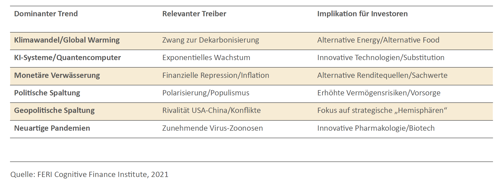T +49 (0) 6172 916-3631
info@feri-institut.de
Rathausplatz 8 - 10
D-61348
Bad Homburg
The FERI Cognitive Finance Institute (FCFI) sees the current decade until 2030 as a decade of massive acceleration and has coined the term "Progressive Twenties" for it. In a recent study, FCFI predicts extraordinary momentum and enormous upheaval in the coming years. "Dominant megatrends such as climate change, digitalization, monetization and political division will decisively change the future. These trends are extremely dynamic and have enormous disruptive potential due to their high intensity and speed of spread," says Dr. Heinz-Werner Rapp, founder and head of the FERI Cognitive Finance Institute. In the study "The Great Progression: The Decade of Massive Acceleration - Causes and Possible Consequences", the FCFI analysed the impact of progressive megatrends in the areas of environment, technology, financial system, society and politics/geopolitics.
According to the FERI Cognitive Finance Institute, the main drivers of massive upheavals lie in natural or man-made phenomena that are virtually irreversible. "At the forefront are increasingly severe climate damage, high global debt combined with massive money creation, and the disruptive consequences of new technologies such as artificial intelligence," Rapp said. Political weakness, social division and populism, as well as the strategic conflict between the USA and China for global dominance, are exacerbating this situation. It is therefore crucial to recognize and understand the complex interaction of different trends and drivers at an early stage.
"The 'Progressive Twenties' are putting societies and institutions under massive pressure to change. If you underestimate this dynamic, it will only get bigger," says Rapp. Politics in particular, with its slow decision-making mechanisms, is becoming a driven force. Each of the trends described continues over a longer period of time and becomes stronger and stronger as a result of structural drivers. In addition, strong feedback effects, tipping points and other non-linearities lead to sudden acceleration. "Progressive trends create high pressure to adapt and offer only short-term reaction times," Rapp explains. For entrepreneurs, asset owners and investors, it is therefore crucial to familiarize themselves with the scenario of a "Great Progression" in good time, he says.
The FERI Cognitive Finance Institute has already analysed progressive trends and their potential impact on the economy, society and politics in detail in previous studies. "Many of the problems can only be solved through intensive research, a strong entrepreneurial spirit and innovative technologies," emphasises Dr Heinz-Werner Rapp. Topics such as decarbonisation, alternative food, artificial intelligence or biotechnology offer investors a broad spectrum to actively participate in the "Progressive Twenties", especially since progressive trends are often relatively independent of the normal market environment: "Under these conditions, the decade of the 'Great Progression' can be a very attractive period for strategic investors."

An abridged German version of the study summarizing the key findings can be found here. The full German study is available by sending an email to info@feri-institut.de.
T +49 (0) 6172 916-3631
Rathausplatz 8 - 10
D-61348 Bad Homburg